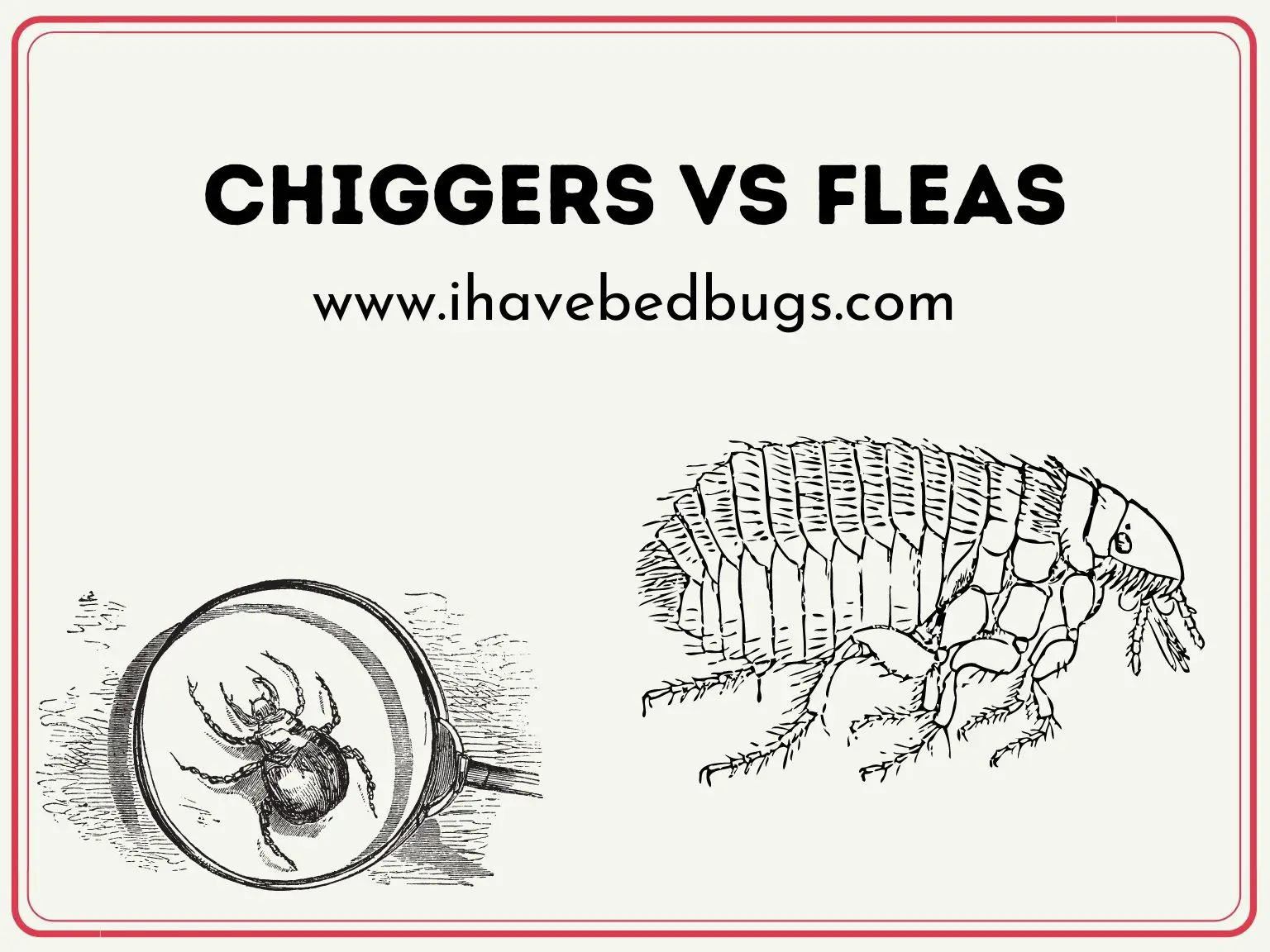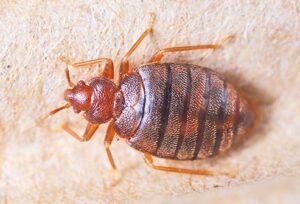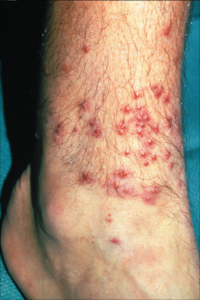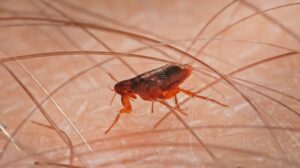Although it can be fascinating to watch insects’ behavior from a distance, bug bites are excruciating and take considerable time to heal.
This is especially true for fleas and chiggers. Both are infamous for their painful bites, but it can be hard to determine whether a chigger or a flea has bitten you.
If you have itchy bumps on your lower body, keep reading for a complete guide on chiggers and fleas and how to treat those bug bites.
What Are Chiggers?
Most people are familiar with fleas, but chiggers are less common. Chiggers, also known as berry bugs or harvest mites, are small reddish-brown insects that belong to the arachnid family, like spiders.
Chiggers are commonly found in tall grass in forests, berry patches, and near lakes. Yet, those red bugs are minuscule, only 4 mm long, so it’s challenging to spot them without a magnifying glass!
Also, those small insects become active in warm weather, so expect to stumble upon them in spring and summer.
What Do Chigger Bites Look Like?
Adult chiggers tend to steer clear of humans; it’s actually chigger larva that you should beware of. In this stage, the larva waits for a host, be it an animal or human, then attaches itself to the skin and feeds off skin cells.
Alarmingly, this can go on for two days until the chigger gets its fill and detaches itself from the host. Chigger bites tend to look like small clusters of red welts and skin bumps.
Pain in the bite region is also common. Moreover, a chigger bite is incredibly itchy. Most patients report that the itching can be so severe that it keeps them awake at night.
Chiggers usually attack body regions where clothes fit tightly to ensure close contact with the skin, making the groin one of their favorite areas to bite. Consequently, this can lead to summer penile syndrome that causes lasting pain and trouble urinating in men.
How to Avoid Chigger Bites
Fortunately, preventing chigger bites is extremely easy. All you have to do is the following.
Avoid Direct Contact With Grassy Areas
The best way to prevent chigger bites and those nasty itching allergic reactions is to avoid getting bitten by a chigger in the first place.
So, make sure to wear long pants and long sleeves whenever you go hiking. If you plan to have a picnic in your local park, make sure to bring a blanket with you to avoid sitting directly on the grass.
Pack That Bug Repellent!
Your trusty bug repellent can work wonders when it comes to keeping those pesky insect bites at bay. Luckily, any repellent containing N, N-Diethyl-meta-toluamide (DEET) should do the trick. Just make sure not to spray it on your face or open wounds.
To ensure maximum protection, avoid using heavily scented soaps and lotions if you plan to pass through a chigger-infested area since they tend to make you smell like a tasty chigger meal!
How to Treat Chigger Bites
Chigger bites rarely cause complications, but they’re still a pain to deal with. So, follow the next few tips.
Take a Shower
Chiggers can linger on human skin for days. So, once you suspect you’ve been bit by a chigger, the best thing you can do is take a hot shower and scrub your body well with soap. This way, you can shake off any chiggers that might’ve made it home with you.
Use Suitable OTC Medications
Some OTC medications can offer quick relief if you notice a random cluster of chigger bites. Consider taking acetaminophen to reduce swelling. A numbing agent and other creams like calamine lotion can also bring down the increased redness caused by chigger bites.
Book a Follow Up Appointment
If you’ve recently traveled to Southeast Asia or Australia, you’re at risk of contracting scrub typhus from chigger bites. So, it’s crucial to check with your healthcare provider even if the bites start to get better.
Through conducting a physical exam and studying your general health history, your doctor can rule out the risk of drainage fever and prescribe new medicine like steroids or antibiotics, if needed. Overall, chigger bites treated by a medical professional have a higher chance of healing quicker.
How to Identify Fleas
Fleas are even smaller than chiggers, averaging 2.5 mm long at their adult stage. Although there are more than 2500 known flea species, most share the same distinctive long, flat bodies.
Their colors range between dark brown and black, and they’re commonly found in shrubs and grassy areas. Fleas usually hide in animal fur, so if you have a cat or dog at home, you might be at risk of getting a flea infestation.
How Do Flea Bites Look?
As opposed to chiggers, fleas only bite humans at their adult stage. In fact, feeding is a necessary part of their life cycle, as females lay eggs directly after ingesting blood.
Although fleas are wingless, their hind legs are incredibly strong, allowing them to jump up to 12 inches. Unlike chigger bites that can appear on any part of the body, flea bites usually resemble small bumps clustered in a straight line on the feet and lower legs with a large red halo around them. So, if you notice any sore spots on other body areas, they might actually be bed bug bites.
How to Deal With Flea Bites
A flea might’ve bit you if you notice clusters of raised skin bumps. Pain isn’t usually an issue, but the bites can still be itchy, as flea saliva stimulates the body to produce histamine, causing irritation. So, here’s how to deal with flea bites.
Look Out for Any Severe Allergic Reaction
Like mosquito bites, flea bites usually don’t cause an allergic reaction. However, you should consult your healthcare provider if you notice that a flea bite has turned into a blister since this is a sign that you’re allergic to flea saliva.
Fleas infected with plague can also transmit the disease to humans. The symptoms of plague include:
- Trouble breathing
- Tightness in the chest or throat
- Feeling faint
- Abdominal pain and vomiting
In this case, you need to seek your local emergency medical service immediately. Doctors usually prescribe strong antibiotics to treat plague cases.
Avoid Scratching
Scratching can exacerbate the problem and cause infections. To alleviate flea bite irritation, you can take antihistamines or apply a hydrocortisone ointment to the area.
Home remedies like oatmeal, honey, and aloe vera are great options for reducing swelling and itching.
Control the Infestation
Unlike chiggers, fleas often infest homes, especially ones that have furry pets. To prevent flea bites, the best thing you can do is end the infestation in your house.
First off, treat any cats or dogs you have using flea drops and clean their bedding. Then, you can use an aerosol spray to kill all the remaining fleas. However, make sure to choose one that includes both permethrin and a growth regulator to get rid of adult fleas, pupae, larvae, and eggs.
Finally, make sure to mow your lawn and vacuum any carpets and upholstery.
Bottom Line
Telling the difference between chiggers vs. flea bites can be challenging. However, after reading our guide and key points, you’re now ready to conquer those pesky bugs and treat any bites they might leave! Regardless of which insect caused the bite, both bites cause swelling and itching.
Signs of allergic reactions should always be monitored, especially in young children, to avoid complications. Fortunately, flea and chigger bites diagnosed by a healthcare provider don’t cause lasting health issues.
References:
- https://www.earth.com/earthpedia-articles/ouch-what-is-a-chigger-and-where-do-they-live/
- https://www.webmd.com/skin-problems-and-treatments/prevent-treat-chigger-bites
- https://www.getmypests.com/what-do-fleas-look-like
- https://my.clevelandclinic.org/health/diseases/21718-flea-bites
- https://www.healthline.com/health/healthy-home-guide/how-to-get-rid-of-fleas#outdoor-flea-removal




